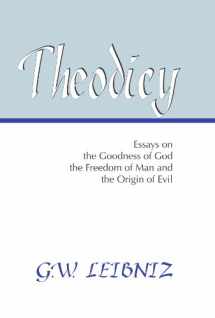
Theodicy
ISBN-13:
9781579104320
ISBN-10:
1579104320
Edition:
Translation
Author:
G. W. Leibniz
Publication date:
2001
Publisher:
Wipf & Stock Publishers
Format:
Paperback
448 pages
Category:
Churches & Church Leadership
,
Christian Books & Bibles
,
Philosophy
,
Religious Studies
,
Good & Evil
,
Philosophy
FREE US shipping
Book details
ISBN-13:
9781579104320
ISBN-10:
1579104320
Edition:
Translation
Author:
G. W. Leibniz
Publication date:
2001
Publisher:
Wipf & Stock Publishers
Format:
Paperback
448 pages
Category:
Churches & Church Leadership
,
Christian Books & Bibles
,
Philosophy
,
Religious Studies
,
Good & Evil
,
Philosophy
Summary
Theodicy (ISBN-13: 9781579104320 and ISBN-10: 1579104320), written by authors
G. W. Leibniz, was published by Wipf & Stock Publishers in 2001.
With an overall rating of 4.4 stars, it's a notable title among other
Churches & Church Leadership
(Christian Books & Bibles, Philosophy, Religious Studies, Good & Evil, Philosophy) books. You can easily purchase or rent Theodicy (Paperback) from BooksRun,
along with many other new and used
Churches & Church Leadership
books
and textbooks.
And, if you're looking to sell your copy, our current buyback offer is $0.36.
Description
Excerpt: ... God an absolute and independent will, whereby he wills that all things be done 225 just as they are done, and another which is relative, and which concerns the merit or demerit of men, whereby he wills that his Laws be obeyed' (Descartes, letter 10 of vol. 1, pp. 51, 52. Compare with that the quotation made by M. Arnauld, vol. 2, p. 288 et seqq. of his Reflexions on the System of Malebranche, from Thomas Aquinas, on the antecedent and consequent will of God). 163. Here is M. Bayle's reply to that (Reply to the Questions of a Provincial, ch. 154, p. 943): 'This great philosopher is much mistaken, it seems to me. There would not be in this monarch any degree of will, either small or great, that these two noblemen should obey the law, and not fight. He would will entirely and solely that they should fight. That would not exculpate them, they would only follow their passion, they would be unaware that they conformed to the will of their sovereign: but he would be in truth the moral cause of their encounter, and he would not more entirely wish it supposing he were to inspire them with the desire or to give them the order for it. Imagine to yourself two princes each of whom wishes his eldest son to poison himself. One employs constraint, the other contents himself with secretly causing a grief that he knows will be sufficient to induce his son to poison himself. Will you be doubtful whether the will of the latter is less complete than the will of the former? M. Descartes is therefore assuming an unreal fact and does not at all solve the difficulty.' 164. One must confess that M. Descartes speaks somewhat crudely of the will of God in regard to evil in saying not only that God knew that our free will would determine us toward some particular thing, but also that he also wished it, albeit he did not will to constrain the will thereto. He speaks no less harshly in the eighth letter of the same volume, saying that not the slightest thought enters into the...


We would LOVE it if you could help us and other readers by reviewing the book
Book review

Congratulations! We have received your book review.
{user}
{createdAt}
by {truncated_author}


